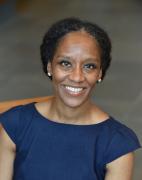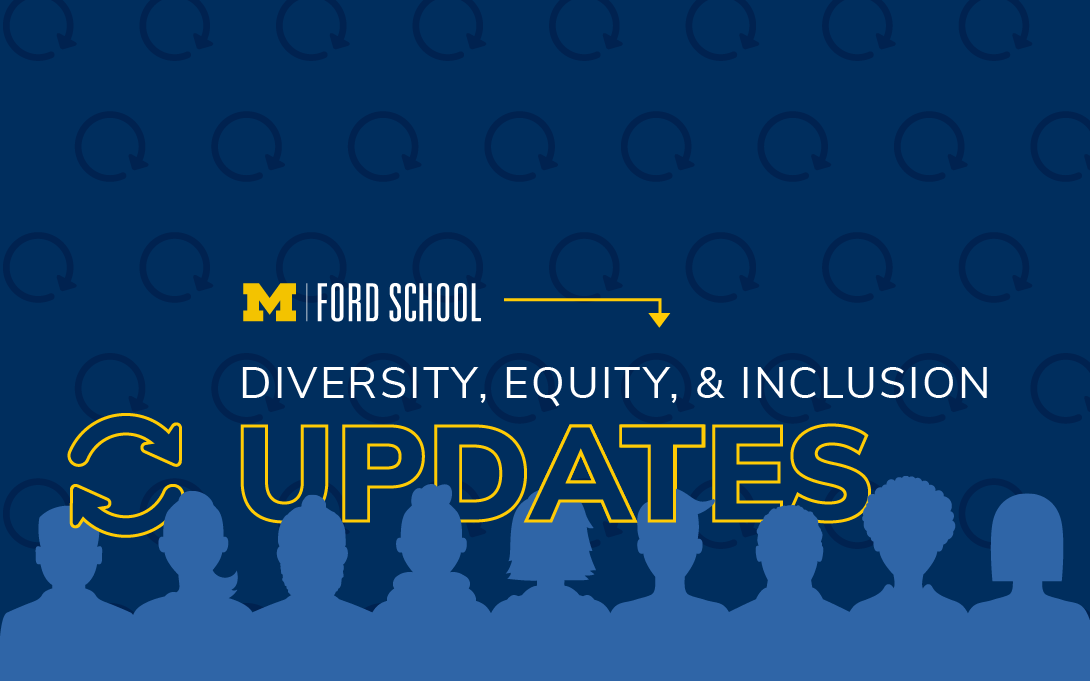
Updates regarding faculty, staff, and student DEI-related activity at the Ford School
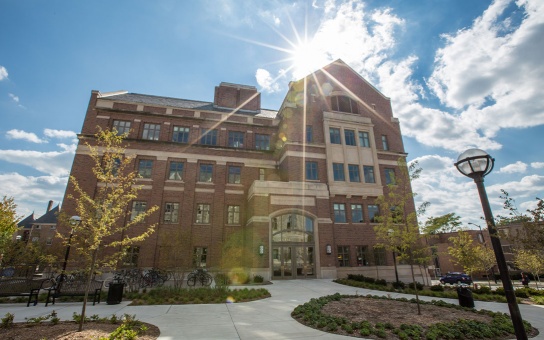
Diversifying who we are
This fall, the Ford School welcomed several new faculty with expertise in education and social policy, national security, and racial justice, and who will help build students’ leadership and negotiation skills. In addition, visiting faculty with significant policy and leadership experience will be on campus to teach and mentor students.
The University of Michigan Regents approved the appointment of Morela Hernandez as the newly established Ligia Ramirez de Reynolds Collegiate Professor of Public Policy. Morela chose to name her collegiate professorship after the first Latin American woman to earn a PhD from the University of Michigan. Read more about Dr. Ramirez de Reynolds and about Morela in our press release.
Diversify what and how we teach
The Ford School has openings for two part-time hourly DEI Research Assistants (RAs). The DEI RA will work closely with the School’s Diversity Officer, support processes related to the DEI 2 year strategic priority, and continue building a Clearinghouse of resources and teaching tools focused on structural/systemic racism, institutional discrimination and social inequality. This is a unique opportunity for students to help advance our DEI strategic objective to diversify what and how we teach and assist with strategic planning and curriculum reform efforts focused on racial justice at its core.
Promoting an equitable and inclusive climate
We’re excited to launch the new Center for Racial Justice! Led by the associate dean for Academic Affairs, Celeste Watkins-Hayes, the center will play a key role in our work to advance the vitally important cause of bringing racial justice to our policy structures. CRJ offers a number of opportunities for students to complement their curriculum with action-based opportunities to understand and address racial inequity.
The Ford School is pleased to provide DEI funding to Ford School student organizations who implement initiatives that promote DEI related values. The purpose of the funding is to encourage student-led programming that advance the Ford School’s four central pillars. All DEI funding proposals should be submitted to Stephanie Sanders at [email protected].
We’re excited to let you know about some notable improvements to Weill Hall, including a renovated student lounge, gender inclusive restrooms, new study nooks, and a personal care space for nursing mothers. The updates make Weill Hall a more inclusive and welcoming space for our community. Learn more about the renovations and new spaces here. There is also a reflection space located along the 5th floor hallway that runs east-west from the main staircase. This space is available for use by Ford School faculty, staff, and students.
All masters- and PhD Ford School students are invited to participate in a student-led Diversity, Equity, and Inclusion Across Policy Programs Racial Justice Survey. The survey seeks to understand and better promote equity in policy curricula and classrooms. Students are encouraged to complete the survey by October 7. Got questions? Contact Crystal Olalde-Garcia, Student Affairs Committee (SAC) Chair ([email protected]) or Doug Ortiz, SAC DEI Chair ([email protected]).
The Ford School DEI Coalition will convene soon! The purpose of the DEI Coalition is (1) to have an identified set of people within the Ford School to whom members of the Ford School community can share ideas, feedback and concerns regarding diversity, equity and inclusion and (2) increase communication between students, faculty and staff in regard to DEI activities, achievements and challenges. Stay tuned for more information from this group.
We’re excited that Kristen Carney, the embedded CAPS clinical social worker, is available to meet with students. Kristen’s areas of interest and training include stress management, anxiety, self-esteem, trauma, and somatic therapy and practices. Feel free to read more about her clinical work and approach here. CAPS staff clinicians are a continued resource for counseling services for enrolled students. Feel free to explore the CAPS team bio page to review the backgrounds and approaches of CAPS staff.
Diversifying our research and policy engagement
Rick Hall wins The American Political Science Association (APSA) career achievement and excellence in mentoring awards. It's the latest honor Hall has received from APSA, the leading professional organization for the study of political science, with more than 13,000 members in more than 80 countries.
In a new study, U-M’s assistant professor of Public Policy and Postdoctoral Scholar in the Society of Fellows Ben Green and computer scientist Yiling Chen (Harvard) provide the first direct evidence that algorithmic risk assessments can systematically alter how people factor in risk when making decisions and do not improve the quality of human decision-making. They demonstrate the unintended consequences of an effort aimed to improve public policy, but in fact creates more harm and exacerbates racial disparities.
Upcoming events
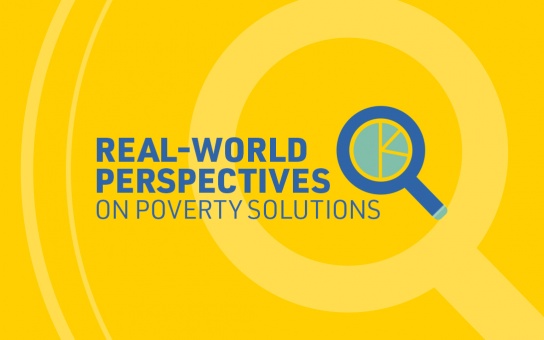
Constructing Community
October 1 | 12:00 - 1:00 PM ET
Real-World Perspectives on Poverty Solutions series
Dr. Jeremy Levine—assistant professor of organizational studies at U-M—will discuss his book, Constructing Community: Urban Governance, Development and Inequality in Boston, which explores the complexities of neighborhood redevelopment in Boston and shows the difficulty of achieving fairness and equity through community participation. All talks are free and open to the public.
Advancing an Anti-Ableist Academy at Michigan
October 4 | 10:00am ET
Featuring keynote speaker Dr. Oluwaferanmi O. Okanlami
A virtual colloquial series of events throughout Disability Community Month, Toward an Anti-Ableist Academy invites the campus community to learn more about creating a welcoming University climate that actively works toward embracing disability culture and experiences. Ableism is defined as discrimination and social prejudice against people with disabilities and/or people who are perceived to be disabled.
Masterclass in Activism with Dr. Johnnetta Betsch Cole
October 6 | 4:00 - 5:30 pm ET
This Masterclass in Activism brings together in conversation Dr. Johnnetta Betsch Cole and Celeste Watkins-Hayes, director of the Center for Racial Justice. Through the Masterclass in Activism, CRJ hosts noted activists and thought leaders who have made significant marks on the policy landscape.
Low-Income Families and the New Welfare State
October 8 | 12:00 - 1:00 pm ET
Real-World Perspectives on Poverty Solutions series
Dr. Carolyn Bates—assistant professor of public policy and political science, Duke University—will discuss her book, State of Empowerment: Low-income Families and the New Welfare State, which explores how interacting with government-funded after-school programs can enhance the civic and political lives of low-income citizens. All talks in this series are free and open to the public.

2021 Diversity, Equity & Inclusion Virtual Summit + Community Assembly
October 11 | 10:00 - 11:30 am ET
Featuring Soledad O’Brien and Valarie Kaur
The DEI Summit provides an opportunity for the University to highlight the progress we've made over the previous year, the changes we're experiencing across campus, and opportunities for continued engagement with our community. This year’s featured keynote speaker is Journalist, Entrepreneur and Television Host, Soledad O’Brien. Following the keynote address, a roundtable conversation will include panelist Valarie Kaur, with additional panelists to be announced soon.
Racial foundations of wealth & inequality
October 12 | 4:00 - 5:30 pm ET
Racial Foundations of Public Policy series
Dr. William Darity—Samuel DuBois Cook Distinguished Professor of Public Policy, African and African American Studies, and Economics and the director of the Samuel Dubois Cook Center on Social Equity at Duke University—will join us virtually on October 12 to discuss the racial foundations of income & wealth and public policy. Racial Foundations of Public Policy is a fall 2021 virtual speaker series that focuses on the historical roots and impact of race in shaping public policy as both a disciplinary field and as a course of action. The series is open to all members of the University of Michigan community and the wider public. Registration is required.
Documenting atrocities: Overcoming barriers in Syria
October 13 | 4:15 - 5:45 pm ET
Donia Human Rights Center Lecture
The panel welcomes Mohammad Al Abdallah, executive director of the Syria Justice and Accountability Centre. Panelist will discuss “Documenting atrocities: Overcoming barriers in Syria" and the decade-long civil war in Syria characterized by human rights atrocities, including the deaths, disappearances, forced displacement, and torture of tens of thousands of Syrians. Registration is required.

Embracing diversity in national security and diplomacy
October 21 | 12:00 - 12:50 pm ET
Public Policy and Institutional Discrimination discussion series
The first session of this fall's Public Policy and Institutional Discrimination discussion series, "Embracing diversity in national security and diplomacy” is facilitated by faculty Ambassador (ret.) Susan D. Page and associate professor of practice Javed Ali. Registration is required.
Obamacare and the Unfinished Crusade for Universal Coverage
October 22 | 12:00 - 1:00 pm ET
Real-World Perspectives on Poverty Solutions series
Jonathan Cohn—a senior national correspondent at HuffPost covering politics and policy—will discuss his book, The Ten Year War: Obamacare and the Unfinished Crusade for Universal Coverage, which examines how the Affordable Care Act — better known as “Obamacare” — came to be, why it looks like it does, and what it has meant for average Americans. All talks in this series are free and open to the public.
Racial foundations of education policy
October 26 | 4:00 - 5:30 pm ET
Racial Foundations of Public Policy series
Dr. Rucker C. Johnson—the Chancellor’s Professor of Public Policy in the Goldman School of Public Policy at the University of California, Berkeley, and faculty research associate at the National Bureau of Economic Research—will join us virtually on October 26 to discuss the racial foundations of education policy. Racial Foundations of Public Policy is a fall 2021 virtual speaker series that focuses on the historical roots and impact of race in shaping public policy as both a disciplinary field and as a course of action. The series is open to all members of the University of Michigan community and the wider public. Registration is required.
A Journey into Dark Matter, Spacetime, and Dreams Deferred
October 29 | 12:00 - 1:00 pm ET
Real-World Perspectives on Poverty Solutions series
Chanda Prescod-Weinstein—assistant professor of physics and a core faculty member for women’s studies at the University of New Hampshire—will discuss her book, The Disordered Cosmos: A Journey into Dark Matter, Spacetime, and Dreams Deferred, which urges recognition of how science is rife with racism, sexism, and other dehumanizing systems and lays out a bold new approach to science and society. All talks in this series are free and open to the public.
Mark your calendars
Child allowance panel
November 5 | 12:00 - 1:00 pm ET
Real-World Perspectives on Poverty Solutions series
Luke Shaefer—director of Poverty Solutions, the Hermann and Amalie Kohn Professor of Social Justice and Social Policy, and a professor of social work at U-M—is among a group of poverty scholars who have contributed significant research on the potential for an expanded child tax credit that follows the design of a child allowance to reduce child poverty rates in the U.S. Shaefer and other panelists—to be announced—will discuss the implications of the expanded child tax credit and the potential for the U.S. to adopt a permanent child allowance. All talks in this series are free and open to the public.
Racial foundations of immigration policy
November 9 | 4:00 - 5:30 pm ET
Racial Foundations of Public Policy series
Dr. Jennifer Lee—the Julian Clarence Levi Professor of Social Sciences at Columbia University and past president of the Eastern Sociological Society—will join us virtually on November 9 to discuss the racial foundations of immigration policy. Racial Foundations of Public Policy is a fall 2021 virtual speaker series that focuses on the historical roots and impact of race in shaping public policy as both a disciplinary field and as a course of action. The series is open to all members of the University of Michigan community and the wider public. Registration is required.
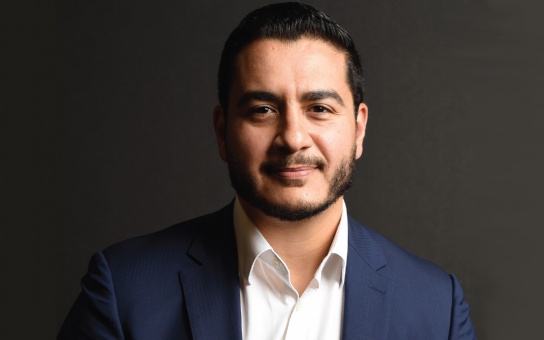
Redesigning healthcare towards equity
November 10 | 12:00 - 12:50 pm ET
Public Policy and Institutional Discrimination discussion series
Dr. Abdul El-Sayed—a Towsley Foundation Policymaker in Residence at the Ford School—will discuss "Redesigning healthcare towards equity.” Registration is required.
Learning and development
National Hispanic Heritage Month is celebrated nationally from September 15th - October 15th. U-M’s Office of Multi-Ethnic Student Affairs lead U-M’s Latinx Heritage Month efforts.This is a time to recognize and celebrate the many contributions, diverse cultures, and extensive histories of the American Latino community. Download the full calendar of Latinx Heritage Month events.
October is National Disability Employment Awareness Month. This is a time to observe and pay tribute to the accomplishments of the men and women with disabilities whose work helps keep the nation’s economy strong. The Business & Finance Diversity Working Group invites all B&F to learn more about diversity in two Zoom webinars: “Disability Awareness” and “Disability Etiquette.” Both one-hour sessions will be facilitated by Christina Kline, ADA Coordinator, and Associate Director in the Office for Institutional Equity. Learn more and register now for these disability Zoom events.
- The month of October is filled with a focus on mental health education and depression awareness and the need for accessible and affordable mental health screenings. Throughout October:
- October is National Depression & Mental Health Screening Month.
- October 8 is National Depression Screening Day.
- October 10 is World Mental Health Day.
Below are opportunities, along with links to information where faculty, staff, and students can learn more about ideas on how to participate and receive support.
Faculty and staff
- Leaders Creating a Culture of Connection Sample Workshop
- Fostering Social Connections Discussion Group
Students
- Embedded CAPS counselor Kristen Carney, [email protected]
- The Wolverine Support Network (WSN), is a student organization -- sponsored by CAPS -- with a mission to create an inclusive and supportive community for all students on campus, undergraduate and graduate.
- SilverCloud Interactive Mental Health Resource is an online, self-guided, interactive mental health resource that provides cognitive behavioral interventions. It is available for faculty, staff, and students and can be accessed 24/7
- Eisenberg Family Depression Center
For more information on U-M DEI Initiatives, visit http://diversity.umich.edu/.
Resources
Ford School of Public Policy
- Susan Guindi, Director, Student and Academic Services
[email protected] | (734) 615-7408 - Catie Hausman, Ph.D., Associate Professor of Public Policy
[email protected] | (734) 615-6951 - Stephanie Sanders, Ph.D., Diversity, Inclusion, Equity Officer/Lecturer
[email protected] | (734) 615-4402 - Celeste Watkins-Hayes, Ph.D., Associate Dean for Academic Affairs [email protected] | (734) 615-6926
Campus resources
- Counseling and Psychological Services (CAPS) | (734) 764-8312
- Services for Students with Disabilities | (734) 763-3000 | (734) 615-4461 (TDD) | (734) 619-6661 (VP)
- Faculty and Staff Counseling and Consultation Office | (734) 936-8660
- International Center | (734) 764-9310
- Maize and Blue Cupboard
